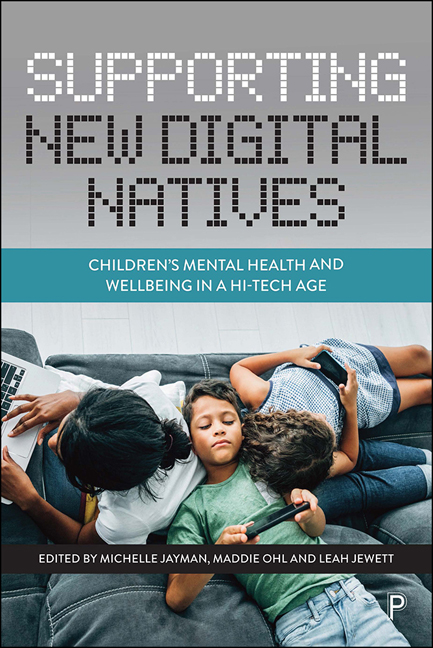Book contents
- Frontmatter
- Dedication
- Contents
- List of figures and tables
- Glossary
- Notes on contributors
- Foreword
- Preface
- 1 Digital lives: growing up in a hi-tech world and staying mentally healthy
- 2 Pyramid Club: building skills for healthy friendships and relationships in a digital age
- 3 Supporting children’s healthy socio-emotional development through play: Book of Beasties – the mental wellness card game
- 4 The School Counselling Partnership: providing support and promoting self-care for school communities
- 5 The Breeze Project: supporting children and young people through Forest School
- 6 Promoting the mental health of girls and young women in the community: the role of Girlguiding
- 7 Supporting families to navigate the changing sex-education landscape: Outspoken Sex Ed
- 8 The Lift Off programme by Red Balloon: online learning and wellbeing support for children who self-exclude from school
- 9 The LifeMosaic project: supporting wellbeing and empowering pupils through design, development and research
- 10 Building better mental wellbeing for children: rebel thinking and innovative practice
- Index
5 - The Breeze Project: supporting children and young people through Forest School
Published online by Cambridge University Press: 13 May 2022
- Frontmatter
- Dedication
- Contents
- List of figures and tables
- Glossary
- Notes on contributors
- Foreword
- Preface
- 1 Digital lives: growing up in a hi-tech world and staying mentally healthy
- 2 Pyramid Club: building skills for healthy friendships and relationships in a digital age
- 3 Supporting children’s healthy socio-emotional development through play: Book of Beasties – the mental wellness card game
- 4 The School Counselling Partnership: providing support and promoting self-care for school communities
- 5 The Breeze Project: supporting children and young people through Forest School
- 6 Promoting the mental health of girls and young women in the community: the role of Girlguiding
- 7 Supporting families to navigate the changing sex-education landscape: Outspoken Sex Ed
- 8 The Lift Off programme by Red Balloon: online learning and wellbeing support for children who self-exclude from school
- 9 The LifeMosaic project: supporting wellbeing and empowering pupils through design, development and research
- 10 Building better mental wellbeing for children: rebel thinking and innovative practice
- Index
Summary
For some time there has been concern about the effects of children's disconnection from nature. In his book, Last Child in the Woods, Richard Louv coined the term ‘nature deficit disorder’, suggesting that the increasing use of digital technology and parental fear have contributed to ‘endemic obesity, attention deficit disorder, isolation and childhood depression’ (Louv, 2005: np). The growth of Forest School in recent years has, in part, been driven by a desire to reconnect children with nature (Leather, 2018) and to provide an alternative to the digital world experienced by today's children and young people (CYP).
Forest School was developed in the UK in the 1990s by early years practitioners at Bridgwater College, Somerset, who had visited Danish preschools and taken inspiration from Scandinavian models of friluftsliv (roughly translated as ‘open air living’). It further draws on a rich history of outdoor learning in the UK, from the Romantics (for example Wordsworth and Ruskin) to the Scout movement, Woodcraft Folk and adventure education, and from a range of progressive educationalists such as Pestalozzi, Steiner, Froebel, Dewey, Isaacs, Montessori and McMillan (Cree and McCree, 2012). Forest School has evolved through a network of practitioners and, via consultation, established six principles:
1. Forest School is a long-term process of regular sessions, rather than one-off or infrequent visits; the cycle of planning, observation, adaptation and review links each session.
2. Forest School takes place in a woodland or natural environment to support the development of a lifelong relationship between the learner and the natural world.
3. Forest School uses a range of learner-centred processes to create a community for being, development and learning.
4. Forest School aims to promote the holistic development of all involved, fostering resilient, confident, independent and creative learners.
5. Forest School offers learners the opportunity to take supported risks appropriate to the environment and to themselves.
6. Forest School is run by qualified Forest School practitioners, who continuously maintain and develop their professional practice. (FSA, 2020, np)
The Forest School Association (FSA) was formed in 2012 and Forest School is now a popular outdoor learning approach used in schools and community settings throughout the UK.
- Type
- Chapter
- Information
- Supporting New Digital NativesChildren's Mental Health and Wellbeing in a Hi-Tech Age, pp. 78 - 96Publisher: Bristol University PressPrint publication year: 2021

